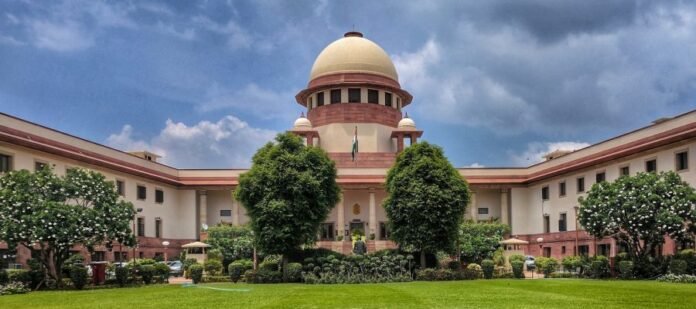Supreme Court seeks responses from Centre and nine states on plea alleging detention of Bengali Muslim workers as Bangladeshis. Focus keyword: detention of Bengali Muslim workers.
In a significant development, the Supreme Court on August 14 issued notices to the Centre and nine states over a public interest litigation challenging the detention of Bengali Muslim workers under suspicion of being Bangladeshi.
The Supreme Court of India on August 14, 2025, issued notices on a public interest litigation (PIL) alleging that Muslim migrant workers from West Bengal are being indiscriminately detained across various states under suspicion of being Bangladeshi nationals. A bench comprising Justices Surya Kant and Joymalya Bagchi heard the plea and directed both the Union government and several state and union territory respondents to submit their responses.
The states and UTs asked to respond include Odisha, Rajasthan, Maharashtra, Delhi, Bihar, Uttar Pradesh, Chhattisgarh, Haryana, in addition to West Bengal. Observing the gravity of the allegations, the bench questioned how the directions sought by the petitioners could feasibly be implemented at a national level. It further indicated a willingness to explore remedial measures to prevent such reported detentions from occurring pan‑India.
Background and Legal Context
The PIL brings to light concerns over due process and civil rights. It alleges that poor migrant workers, predominantly Bengali-speaking Muslims, have faced detention in several states on the assumption that they are undocumented Bangladeshis. Such actions, if corroborated, raise constitutional issues including violations of personal liberty, non-discrimination, and the right to movement enshrined under Articles 14, 21, and 19(1)(d) of the Constitution.
The petition calls for clarity on:
- Identification protocols for determining nationality.
- Safeguards against arbitrary detentions, especially of vulnerable migrant communities.
- Uniform guidelines nationwide to prevent rights violations due to misinformation or prejudice.
The bench’s referral to the Union and concerned states underscores the matter’s urgency in ensuring accountability and legal clarity.
Analytical Insight for Legal Professionals
Constitutional Safeguards and Due Process
Arbitrary detention, especially on religious grounds, strikes at the heart of constitutional guarantees. The Court’s notice emphasizes the need for legal robustness. It raises questions about whether migrants are being detained without access to legal counsel or prompt review by judicial or quasi‑judicial authorities.
State-Specific Policies vs. Uniform Standards
State governments often manage immigration and internal security through varied mechanisms. Absent a central standard, enforcement becomes disjointed. The Court’s engagement could catalyze the creation of holistic, centrally regulated protocols, balancing sovereignty concerns with civil liberties.
Implications for Minority Rights
The potential for systemic abuse, especially targeting minorities, cannot be ignored. The Court’s scrutiny is crucial in safeguarding the rights of marginalized groups. Following precedents like Naga People’s Movement of Human Rights vs. Union of India, the Supreme Court must ensure that protective orders preempt wrongdoing, not follow after harm occurs.
Role of Union Government and Inter-State Coordination
The involvement of the Union government may lead to the formulation of guidelines, capacity-building for local law enforcement, and monitoring frameworks to curb wrongful detentions. The case could further reinforce the role of the National Human Rights Commission (NHRC) or state-level commissions in oversight and redressal.
What Next?
- The Supreme Court’s notice compels submissions within a stipulated timeframe from the Union and all nine respondents.
- These governments must clarify:
- Their current policy for determining and verifying nationality.
- Whether any data exists on detentions matched by religious or communal identity.
- Remedies or redressal mechanisms in place for those, especially vulnerable workers, who may have been wrongfully detained.
Once submissions are in, the Court may enlist expert committees, direct investigations, or even set interim guidelines—a course essential for upholding the rule of law and protecting migrant rights.
Broader Implications
Impact on Migrant Economy
West Bengal’s migrant workforce plays a critical role in sectors like informal manufacturing, construction, and services. Detentions based on suspicion impair labor mobility and disrupt livelihoods. Legal direction will help ensure migrant communities aren’t disenfranchised or economically marginalized.
Social Cohesion and Communal Harmony
Targeting specific religious groups on specious grounds sows mistrust and fear. The judicial process provides an opportunity to protect communal harmony and affirm India’s pluralistic values.
Precedent for Civil Liberties in Migration
This case may establish a paradigm on how courts address mass detentions tied to nationality suspicions—setting standards for evidence, court oversight, and government accountability.
Related Coverage on The Legal Observer
- Dive into related reports in our News section for real-time court updates and legal outcomes.
- Explore our Views & Insight category for expert analysis on constitutional protections and migrant rights.
- Visit the Legal Helpline to understand how affected individuals or advocates can seek support and remedies.
Conclusion:
The Supreme Court’s notice to the Centre and nine states marks a critical judicial intervention in defense of civil liberties. The claims of unlawful detention of Bengali Muslim workers on nationality-based suspicions—and the possibility of systemic bias—demand urgent legal clarification. As responses roll in, the Court’s next steps could shape protections for migrant workers and reinforce India’s commitment to constitutional values.




